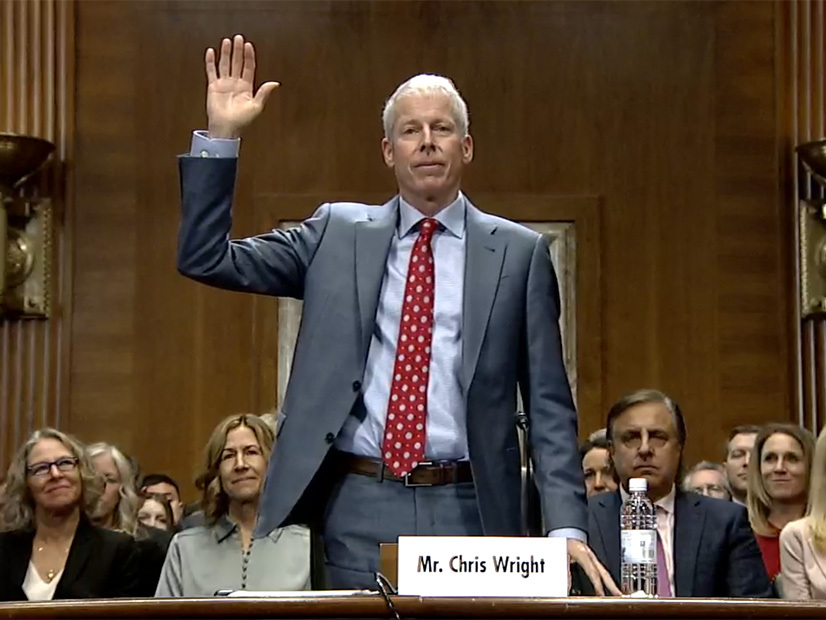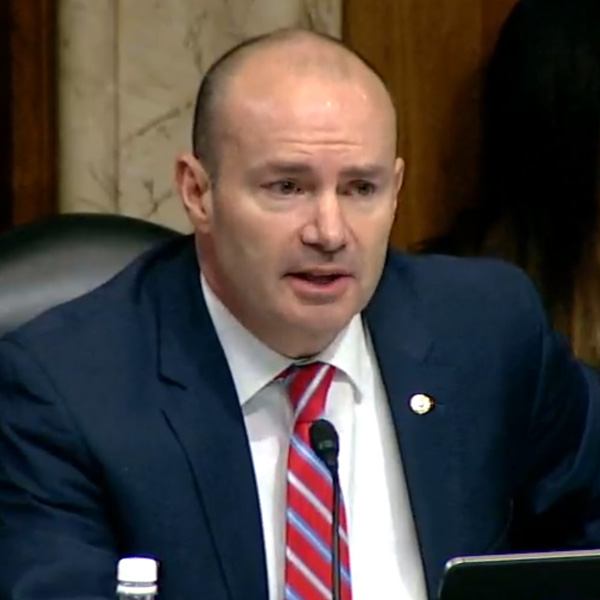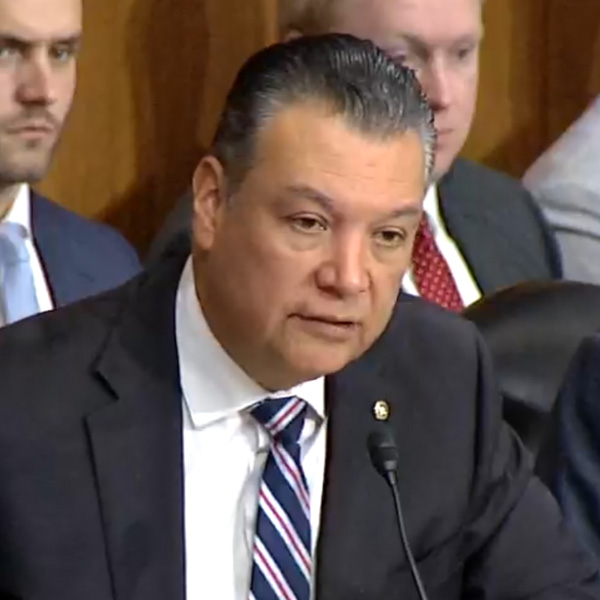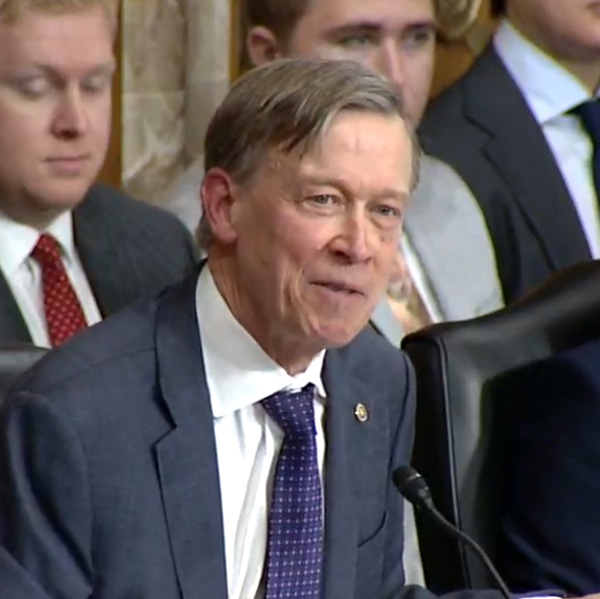
Chris Wright, President-elect Donald Trump’s nominee to head the Department of Energy, positioned himself as a supporter of an all-of-the-above approach to developing generation and transmission before the Senate Energy and Natural Resources Committee on Jan. 15.
In doing so during his three-hour confirmation hearing, Wright — the CEO of Liberty Energy, a natural gas fracking company — acknowledged climate change is real and sought to allay Democratic concerns that the department would favor fossil fuels, though he declined to make specific commitments.
In a typical exchange, Sen. Martin Heinrich (D-N.M.), ranking member of the committee, asked Wright for an assurance that the work of the department’s Grid Deployment Office would be continued “to support the kind of transmission projects that increase reliability and save consumers money.”
Heinrich referred specifically to the Heritage Foundation’s Project 2025 and its recommendation for eliminating the GDO, which has overseen transmission upgrade and expansion initiatives such as the Grid Resilience and Innovation Partnerships program, funded with $10.5 billion from the Infrastructure Investment and Jobs Act.
Without mentioning GDO, Wright said he was “aligned” with Heinrich and, if confirmed, “will seek to find the best ways to improve our transmission grid, including expansion and new lines.”
On the Republican side, Wright provided a nuanced answer to a question from Sen. John Hoeven (R-N.D.) on how to overcome skepticism to increasing fossil fuel production in the U.S. and globally.
“You have to understand that there isn’t dirty energy and clean energy,” Wright said. “All energies are different, and they all have different tradeoffs. Different geographies or locations have climates more favorable to this energy versus that energy. So, it’s a complicated dialogue, which means it’s not easy to get people to share this broader perspective on it.”
Without the growth of new energy technologies, “we wouldn’t have as much energy as we have today,” he said, but “it’s proven very hard to displace hydrocarbons in the global energy system.”
He also told Sen. Dave McCormick (R-Pa.) that he would support new research on fossil fuel innovation.
“Fossil fuels, again, have powered the world throughout my lifetime and will continue to do so,” Wright said. “Even though it’s a critical technology for us, there’s been less interest in it; less interest to talk about it. I don’t share those aversions. I am all about new technology to improve energy sources across the board … including hydrocarbon energy sources.”
Trump’s nomination of Wright as secretary of energy on Nov. 16 was met with mixed reactions, praise from Republicans and cautious optimism from some Democrats who noted his education at the Massachusetts Institute of Technology and University of California, Berkeley and a resume that includes stints in nuclear, wind and solar energy.
He started Liberty in 2011 and has built the company into a major player in the natural gas industry by developing highly energy-efficient fracking equipment. Liberty also has invested in sodium-ion energy storage and next-generation geothermal, and Wright sits on the board of Oklo, a developer of small modular reactors.
A Colorado native, Wright was introduced at the hearing by Sen. John Hickenlooper (D-Colo.), who readily admitted to a long history of disagreeing with the nominee on many energy issues.
“He is indeed an unrestrained enthusiast for fossil fuels in almost every regard,” Hickenlooper said, but “he is a scientist who is open to discussion, and he is, again, a scientist who is a successful entrepreneur and has that ability to assess what is possible and what isn’t.”
‘The Hype over Wildfires’
Wright’s nomination is opposed by some who point to his record of past social media and video pronouncements downplaying the impacts of climate change and denying the existence of an energy transition. Such statements, and his financial support for Trump’s campaign, drew some of the sharpest questions at the Senate hearing.
Sen. Alex Padilla (D-Calif.) cited a social media post in which Wright wrote, “The hype over wildfires is just hype to justify more impoverishment from bad government policies.”
When Padilla pushed him on the statement ― asking if “given the devastation that we’re currently experiencing in Los Angeles, do you still believe that wildfires are just hype?” ― Wright answered, “I stand by my past comment.”
Padilla also asked the nominee if he would stand up to Trump or other administration officials if they pressured him to withhold or suppress research from DOE or the National Laboratories.
“I would follow the scientific method,” Wright said. “I will be honest in integrity and follow the laws and statutes of our country.”
Sen. Mazie Hirono (D-Hawaii) brought up the April 2024 fundraising dinner Trump held at Mar-a-Lago for oil and gas executives, during which he asked for $1 billion in campaign donations and pledged to roll back Biden administration environmental rules.
Responding to Hirono, Wright said he was at the dinner but denied that Trump made a pitch for donations or promised regulatory rollbacks.
GOP Back in the Chair
The hearing also was the first session of committee under its new Republican chair, Sen. Mike Lee (R-Utah), who set the tone for the session with a blistering critique of President Joe Biden’s energy policies.
“Over the past four years, the [Biden] administration has dismantled domestic energy production, canceled leases, and weaponized regulations to discourage investment in pipelines and critical energy infrastructure,” Lee said. “Instead of unleashing American energy, this administration has instead decided to reduce our access to energy, and they’ve reduced many of these tools within the Department of Energy to political tools for advancing extreme climate policies that prioritize ideology over innovations, security and affordability. These failures have caused devastating harm.”
He called on Wright to “ensure that the Department of Energy returns to its founding and all-important purpose,” which he sees as “producing more energy here at home.”
Similarly, Sen. Jim Justice (R-W.Va.), one of the committee’s new members, made a pitch for the centrality of fossil fuels in U.S. energy policy and its economy. “The moment in time when you absolutely believe that we can do without fossil fuels in this world today, you’re living in a cave,” he said.
According to the U.S. Energy Information Administration, U.S. crude oil production hit a record 13.2 million barrels/day in 2024, and the U.S. remains a major natural gas exporter.
Despite some hard questions from Democrats, Wright appeared to have enough bipartisan support to win committee approval and have his nomination voted on by the full Senate.
In his opening statement, Wright echoed Trump’s energy policies aimed at increasing “baseload” resources and rolling back regulations. If confirmed, Wright said his immediate priorities at DOE will be to restore U.S. energy dominance by unleashing American energy at home and abroad; protecting and accelerating the work of the National Labs to promote innovation and U.S. competitiveness; and removing barriers to building new energy projects.
“Energy has been a lifelong passion of mine, and I’ve never been shy about that,” he said. “President Trump shares my passion for energy, and if confirmed, I will work tirelessly to implement his bold agenda as an unabashed steward for all sources of affordable, reliable and secure American energy.”






